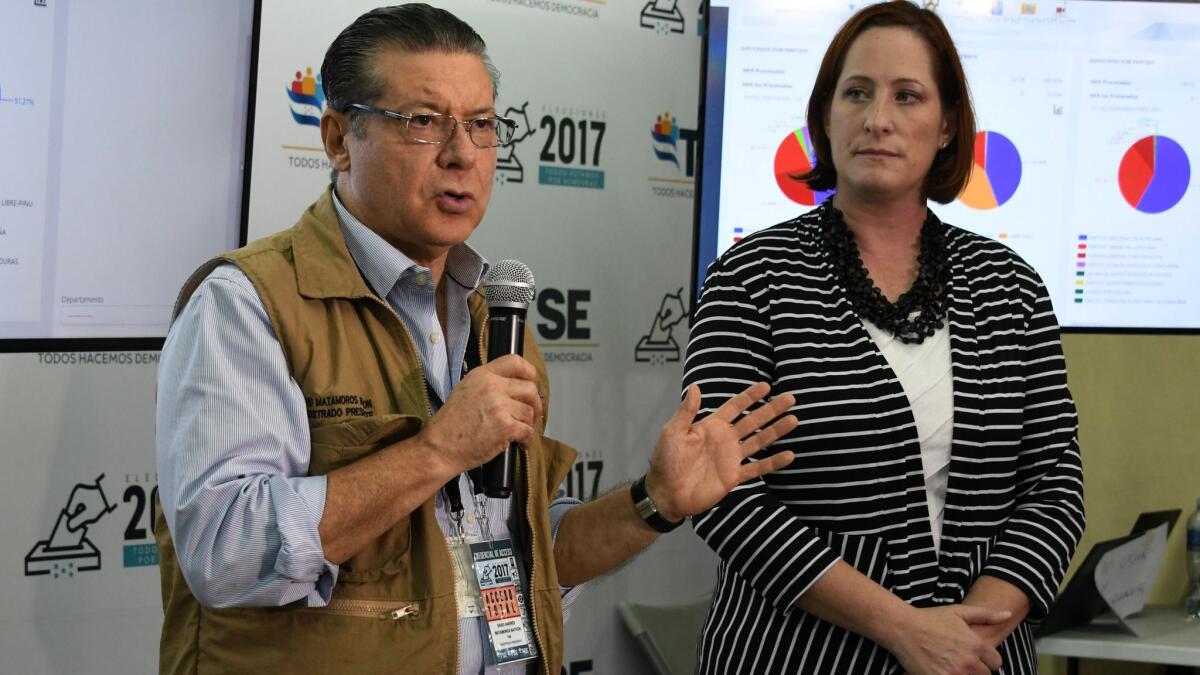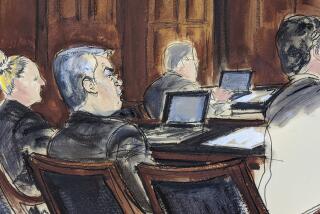Two weeks after Honduras’ still-unresolved election, a sense of disquiet broadens

Almost two weeks after Hondurans went to the polls, the still-unresolved results of the country’s disputed national elections remain a source of uncertainty and disquiet amid widespread allegations of fraud.
A sense of instability has overtaken the country since the election of Nov. 26.
On Friday, Amnesty International charged that the Honduran government was using “dangerous and illegal tactics to silent dissenting voices” amid a wave of post-election protests.
At least 14 people have been killed — mostly by gunfire — and dozens injured “in the context of mostly peaceful demonstrations,” said Amnesty, which placed much of the blame on the nation’s security services.
All eyes are on the upstart presidential challenger, Salvador Nasralla, a television personality and standard-bearer of an opposition alliance contesting the reelection bid of President Juan Orlando Hernandez — a close U.S. ally regularly denounced as a “dictator” by Nasralla.
Hernandez, of the center-right National Party, is seeking a second four-year term despite a previous constitutional ban on presidential reelection. A ruling by a Supreme Court packed with the president’s allies lifted the reelection ban, but critics still call his candidacy illegal.
The still-unconfirmed final vote count ultimately gave the incumbent a narrow, 1.6-percentage-point lead. Both candidates have declared victory.
But the country’s Supreme Electoral Tribunal, which oversees the voting process, has yet to declare a winner as the opposition and international observers have cited widespread reports of fraud.
The protracted post-election controversy has thrown the Central American nation of 9 million — among the poorest and most violent in the hemisphere — into its worst political crisis since a 2009 coup removed President Manuel Zelaya from office.
At the time, coup supporters, including the current ruling party, suspected that Zelaya was using a legal maneuver to get around the constitutional ban on reelection. But now it is President Hernandez, a bitter rival of ex-President Zelaya, seeking a second term.
During the current campaign, Zelaya and his Libre party have been key backers of Nasralla, who is running under the banner of the Opposition Alliance Against the Dictatorship, a center-left coalition.
Nasralla, known here as the Prince of Television, is, like President Trump, a nontraditional politician seeking to turn TV fame and fortune into a long-shot political success story.
And, like Trump, Nasralla, a prolific author of Twitter messages and Facebook posts, finds himself accused at times of arrogance and even narcissism.
For decades Nasralla has been a ubiquitous game-show host, sports broadcaster, beauty-pageant emcee and indefatigable promoter of his own singular brand.
Last year, the 64-year-old entertainer married a former Miss Honduras, 38 years his junior, and announced on Twitter this past June that the couple was expecting their first child.
The marriage sparked public speculation that the nuptials were meant to counter persistent reports that Nasralla is gay — an assertion that he has repeatedly denied. He told an interviewer here inquiring about the rumors that he had had sex with more than 700 women.
Four years ago, Nasralla finished third in the presidential race under the banner of the Anti-Corruption Party, which he cofounded. But his alliance with Zelaya’s Libre bloc in this year’s elections has expanded Nasralla’s political base, while shifting his political discourse to the left. Nasralla has vowed to increase opportunities for the country’s poverty-stricken multitudes.
Nasralla’s message of change and vow to end ingrained corruption appear especially attractive to young Hondurans, who represent a major segment of Nasralla’s support.
“Nasralla may be a TV personality, he may be funny, he may be arrogant, but one thing he is not is corrupt,” said Marcela Trejo, 23, who was among the thousands marching in the capital during a pro-opposition demonstration Dec. 3. “He is not a thief.”
The post-election period in Honduras has featured cascading allegations of electoral fraud.
Last week. 6, the Organization of American States’ mission here declined to endorse the official count, citing the election’s “lack of guarantees and transparency … the accumulation of irregularities, mistakes and systemic problems.”
The OAS recommended a series of remedial steps, including a recount of almost 20% of the ballots and a review of the voting in three provinces where the opposition says the pro-Hernandez vote was inflated. Electoral authorities have already launched a partial recount.
But on Friday, as the deadline for political parties to file challenges approached, Nasralla raised the stakes, calling for an international commission to oversee a complete recount of the ballots.
Washington has been closely watching the election despite the absence of a U.S. ambassador in Tegucigalpa. The State Dept. has said it will work with whomever is declared the official winner and has pushed back against a perception among many Hondurans that the Trump administration supports President Hernandez.
Hernandez is widely reported to have a close working relationship with John Kelly, President Trump’s chief of staff and a former commander of the United States Southern Command, which oversees Pentagon operations in Central and South America and the Caribbean.
During the Cold War, Washington viewed Honduras as a staunch ally and operations base at a time when left-wing rebellions spread through Central America. Honduras retains deep ties to the Pentagon.
On Friday, the U.S. charge d’affaires in Tegucigalpa, Heide B. Fulton, posted a statement on Twitter backing the Organization of American States’ recommendations for a partial recount and other steps.
“We believe that, if implemented, these measures would provide an effective approach to evaluate the irregularities observed and reach a credible conclusion to the electoral process that reflects the will of the Honduran people,” the chief U.S. diplomat in Honduras said.
--Cecilia Sanchez of the Times’ Mexico City bureau contributed.
Twitter: @PmcdonnellLAT
More to Read
Start your day right
Sign up for Essential California for news, features and recommendations from the L.A. Times and beyond in your inbox six days a week.
You may occasionally receive promotional content from the Los Angeles Times.






